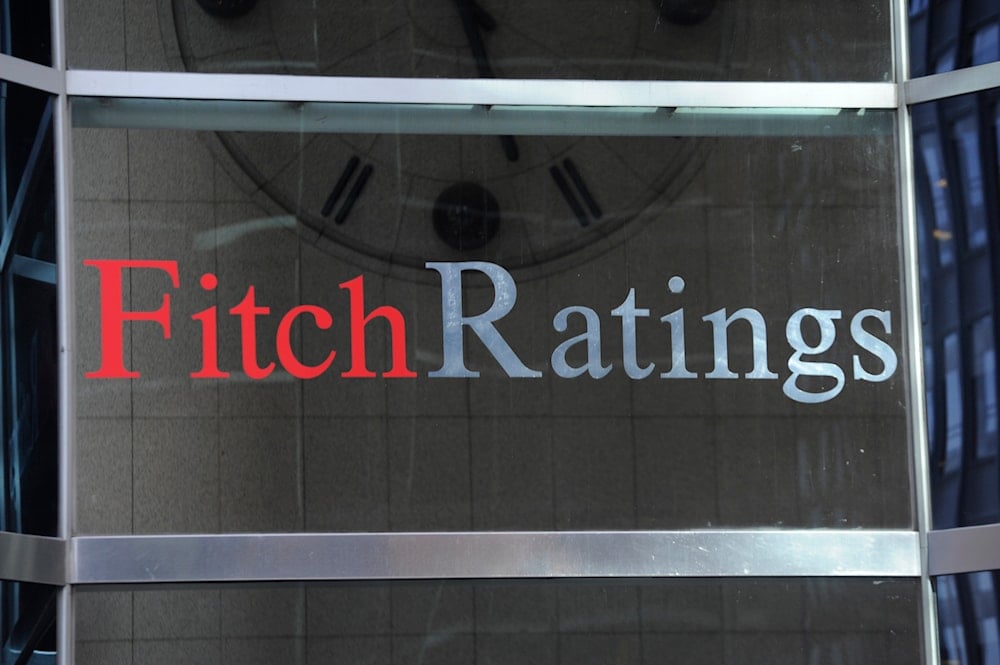Israeli media: S&P and Fitch to downgrade 'Israel' in Moody's steps
Israeli media criticize the Israeli Minister of Finance and his lack of adherence to Moody's advice.
-

This photo shows signage for Fitch Ratings, Sunday, Oct. 9, 2011, in New York. (AP)
The Israeli Walla! website confirmed that after Moody's lowered "Israel's" credit rating, it is expected that both rating companies S&P and Fitch would soon publish their decision on "Israel's" credit rating. It added that if the latter rating companies have not yet come to a decision, the events of this week give them the ultimate legitimacy for a downgrade.
The above-mentioned estimate are from an article published by Walla! today in which it criticized the hostile attack launched by the Israeli Minister of Finance Bezalel Smotrich, in response to Moody's credit rating of the occupation, in which he accused them of taking a political decision instead of an economic one.
Walla! further stressed that Moody's waited until after the budget plan was published following its first reading, which shows that their decision was economic and not political.
Incompetence is expected when in stolen land
The Israeli website further stated that it had hoped that the Israeli Ministry of Finance, amid the budget's approval, would work on improvements as per Moody's recommendations like taking additional measures to reduce the deficit or encourage growth by implementing reforms in education and transportation, or cuts to some funds. However, the reality was quite the opposite as last week, the ministry had not only failed to apply the report’s recommendations but completely acted in contradiction.
Walla! noted that the Knesset sanctioned the Israeli Ministry of Finance for violating the occupation's Basic Law, as it submitted the budget for approval after its legal deadline, which in turn will divide some laws, and their discussion would have to be in several Knesset committees, risking their approval due to political motives.
The website further confirmed that all the important decisions the ministry is attempting to issue, which in its evaluation, are equivalent to a value of 5 billion shekels ($1.39 billion), will not be approved. This will prompt the ministry to look for alternative sources. If the latter are not found, the deficit will exceed the 6.6% predicted by the ministry itself, leading toward a double-digit deficit.
Walla! further stated that this reality is amid Netanyahu’s fear of taking strict measures that would put his government at risk, which further confirms that Moody’s was also right about the political connotations of the rating.
Earlier this week, Israeli media stated that the downgrade of "Israel's" credit rating by Moody's was not just another light blow to the Israeli economy, and that after the security failure, the repercussions of the economic failure are also becoming evident.
The economic affairs correspondent for the Israeli newspaper Yedioth Ahronoth, Gad Lior, said that lowering the credit rating could hit the Israeli economy like thunder on a clear day, and that for the first time in many years, it will cause a storm in the Israeli economy that they have not seen in years.
Moody's lowered "Israel's" rating
Moody's, the US ratings agency, decreased "Israel's" credit rating on February 9 due to the repercussions of its ongoing war on Gaza, downgrading it by one level from A1 to A2.
It stated that it made the downgrade after evaluating that "the ongoing military conflict with Hamas, its aftermath, and broader ramifications significantly increase the political risk for Israel, while also undermining its executive and legislative institutions as well as its fiscal strength, in the foreseeable future."
The rating agency also revised its outlook for "Israel's" debt to "negative" citing "the risk of escalation" with Hezbollah. It stated that the "risks of escalation of the conflict with Hezbollah still exist, increasing the possibility of a major negative impact on the Israeli economy".

 4 Min Read
4 Min Read








